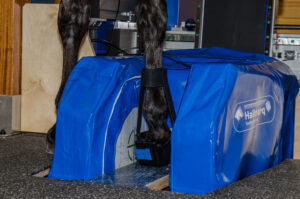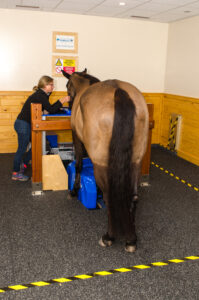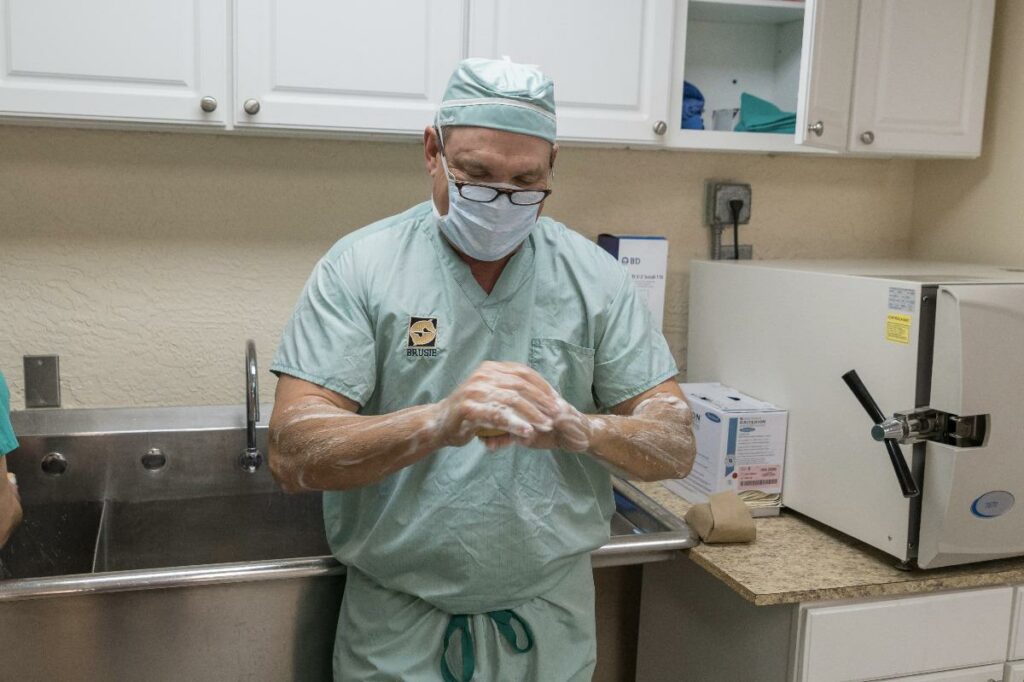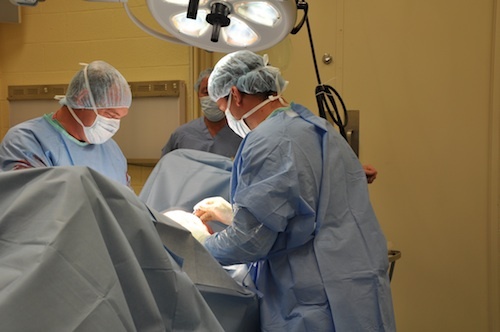Month: May 2019
Palm Beach Equine Clinic has the most advanced state-of-the-art diagnostic imaging equipment available. More specifically, Equine Standing Magnetic Resonance Imaging (MRI) allows Palm Beach Equine Clinic to quickly and accurately diagnose injuries for their clients.

Every horse owner dreads seeing signs of lameness or discomfort in any horse, whether it is a backyard companion or a top-caliber sport horse. For performance horses, however, one of the first questions many owners ask upon contacting a veterinarian about a problem is, “Can the horse safely and comfortably return to work?” Using Palm Beach Equine Clinic’s cutting-edge equine standing MRI technology, the clinic veterinarians are best equipped to answer that question.
The equine standing MRI produces highly detailed images in several different planes to capture a complete image of the desired area. An MRI is best used to further define a specific area of bony or soft tissue that has been pinpointed as the origin of lameness. The process can be completed while the horse is in a standing position and requires only light sedation.

Lameness or performance problems are most frequently approached through routine x-rays and ultrasounds, which can come back normal. Thus, it is difficult to diagnose subtle problems because the most common tools are not sensitive enough to pick them up. At Palm Beach Equine Clinic, the Equine Standing MRI gives veterinarians an advantage when troubleshooting a lameness issue and helps them to determine a correct diagnosis in a timely manner.
Hundreds of MRIs are read each year at Palm Beach Equine Clinic. In addition to being a state-of-the-art diagnostic tool, the equine standing MRI technology also affords economic benefits to owners by having their horse’s problem diagnosed and treated safely, effectively, and quickly.
Palm Beach Equine Clinic’s surgical team leader, Dr. Robert Brusie, is a nationally renowned board-certified surgeon whose surgical specialties include orthopedic, arthroscopic, and emergency cases. Dr. Brusie has been the head surgeon with Palm Beach Equine Clinic for the last 20 years and is a beloved part of the team.
Dr. Brusie graduated from Michigan State University (MSU) College of Veterinary Medicine. He completed his surgical residency at the Marion DuPont Scott Equine Center in Virginia in 1989 and has been in private practice ever since. He became a Diplomate of the American College of Veterinary Surgeons in 1994. Dr. Brusie joined the Palm Beach Equine Clinic team in 1996.
Board-certified surgeon, Dr. Brusie is recognized for his expertise in colic surgery, as well as for his skill in arthroscopic surgery. His surgical experience expands the clinic’s progressive care in both emergency and elective procedures. He has published articles on numerous topics, including the equine intestinal tract and septic arthritis in horses. Dr. Brusie is married and has three daughters. Read on to find out more about Dr. Brusie!
What is your background with horses?
I grew up on a farm in Michigan. We had usually between 200 and 600 head of cattle and always between four to six horses. Our horses were cow ponies or driving horses. My dad loved horses and had to have them around. My family has owned our farm for six generations and it pretty much occupied all of our time besides sports and school. Needless to say, we didn’t have much time to show horses.
When and why did you decide to become a veterinarian? Did you know you wanted to be a surgeon from the start?
I decided to become a veterinarian at an early age. I think I was seven or eight years old when I pulled my first calf. One of my dad’s hired men called me “Doc” when I was about that age. When I went to college, my plan was to become a large animal veterinarian and live in my hometown and continue to farm part-time with my three brothers. All of that changed when I was in veterinary school at MSU. Dr. Ed Scott was one of the five surgeons there; he was a gifted surgeon and a great teacher. He steered me into an equine internship at Auburn University. It was one of those things that the more you did, the more you wanted to do to improve yourself. I operated on my first colic by myself when I was three weeks out of vet school (32 years ago).
How did you first start working at Palm Beach Equine Clinic?
I was a surgeon at a clinic in Atlanta, and in 1996 I had performed a surgery for a client of Dr. Paul Wollenman’s. He had started this practice in 1975 and asked me if I needed a job. I was planning on staying in Atlanta for the rest of my career. I received phone calls from the other two partners over the next nine months, and eventually with encouragement from my fiancé, now wife, Melissa, I took the job.
What do you love most about working at Palm Beach Equine Clinic?
We have an exceptional group of veterinarians and staff here. The depth and scope of our veterinarians is amazing due to the large caseload. On any individual case, there may be two to three doctors that have input on the case to ensure no stone is left unturned. Additionally, we are so privileged to work on some of the best show, race, and polo horses in the world. It is truly an honor.

What sets the surgical services at Palm Beach Equine Clinic apart?
Between Dr. Jorge Gomez, Dr. Weston Davis, and myself, we perform just about every type of soft tissue and orthopedic surgeries that are done in our field. Personally, my greatest sense of success is when I see a horse back after surgery going as well or better than it was prior to surgery.
What are the biggest changes you have seen in sport horse medicine over the years?
Currently, the most exciting thing we see going on in medicine is regenerative therapy. Twelve to 15 years ago, we were harvesting bone marrow from the sternum and injecting it into lesions in tendons and ligaments. Now we manipulate the bone marrow or other sources of stem cells to promote more rapid and more functional healing of some of these injuries. I can assure you that in 10 to 20 years what we are doing now will seem stone-aged by then. There are some very clever minds performing some serious research in this field.
How do you stay up-to-date on new medical advances?
Every veterinarian at Palm Beach Equine Clinic tries to attend as many meetings as time allows. We also do a weekly journal club at our clinic to discuss recently published papers in veterinary and human medicine and surgery.
What is the most interesting or challenging surgery that you have done?
Dr. Gomez and I had a three-year-old racehorse that had split his P1 (long pastern bone) and cannon bone in the same leg in a race. We were able to piece together both bones perfectly and the horse recovered brilliantly. He probably could have returned to racing, however, the owners elected to retire him to life as a breeding stallion.
What is something interesting that people may not know about you?
I have three daughters who I am very proud of and tend to brag on maybe a little too much.
How else is the family involved in horses?
My wife [Melissa] and youngest daughter [Kayla] are horse nuts in the true sense of the word. Anything to do with horses, especially show hunters, they are dialed in. Melissa loves riding, and Kayla shows in hunters and equitation.
What makes Palm Beach Equine Clinic a special place for you?
I am blessed to have three good men as business partners. They are my good friends and great people. We are very lucky to have 20-plus veterinarians working with us who are very knowledgeable and caring individuals. We feel like a little practice, but with a lot of people who just get the job done.
Caring for the Senior Performance Horse

Part 2
The veterinarians at Palm Beach Equine Clinic take pride in emphasizing the importance of proper care for equine athletes that are aging into their senior years. Advances in equine medicine are enabling horses to perform longer. Last month, we discussed the importance of routine veterinary examinations to ensure top health, appropriate fitness programs to maintain stamina and muscle mass, treatments for physical discomfort, and proper care throughout the hot summer months. This month, we highlight how the evaluation of metabolic and organ function and proper parasite control can benefit the senior performance horse.
Horses from the ages of 12 and older are considered “senior.” Many horses that are in the prime of their careers are over this threshold and may require extra maintenance in order to continue performing at their best. Maintaining these athletes in peak condition requires teamwork between the owner and their veterinarian.
Metabolic Function of the Senior Performance Horse
An important component of physical health in the aging equine is the metabolic function. As horses age, they become more prone to develop a metabolic disease known as Cushing’s disease. Cushing’s disease, also known as Pituitary Pars Intermedia Dysfunction (PPID), is when disfunction of the pituitary gland results in increased production of Adrenocorticotrophic Hormone (ACTH), ultimately creating overproduction of the hormone Cortisol. Cortisol is the stress hormone and a surplus of this hormone negatively affects the body.
Veterinarians use the fasting test of ACTH that evaluates the hormone levels to screen for possible Cushing’s disease. This hormone test should be conducted every six months to monitor hormone production.
Cushing’s disease is often detected in older horses between 16 and 23 years of age, but it has been documented in horses as young as eight years old. A few of the clinical signs of Cushing’s disease include a change in body conformation such as the development of a swayback and pot belly, lethargic attitude, and in some horses the growth of long, “curly” hair with delayed shedding. Horses suffering from Cushing’s disease are at serious risk to develop laminitis without any specific predisposing causes.
Occasionally, horses may have Cushing’s disease without showing any outward clinical signs as the onset is quite slow. A simple blood test will be extremely helpful in the early detection of Cushing’s and other metabolic diseases.
Organ Function and Parasite Control
Blood tests are also necessary to determine whether a horse has anemia (low red blood cells). Serum chemistry testing can evaluate liver and kidney function to ensure these organ systems are working properly. Palm Beach Equine Clinic has the laboratory equipment on site to run the vast majority of these tests for rapid same-day results.
Palm Beach Equine Clinic also suggests a fecal test to evaluate a horse’s internal parasite count. In Florida, the peak worm season is year-round due to the lack of frost. The effectiveness of different dewormers can be measured using a fecal egg count reduction test, which involves performing a fecal egg count before and after deworming a horse. Equine tapeworms are difficult to identify in fecal examinations, so deworming for tapeworms annually with a product containing praziquantel, available in products such as Zimectrin Gold®, Equimax®, and Quest Plus®, is strongly recommended.
Establishing an effective deworming program for equine parasites has become a debated topic as veterinarians have changed their views on worming in recent years. New research has found that a minimal parasite load within the horse’s hind gut is actually helpful in producing a natural immunity. However, it is crucial to control the parasitic load. Due to the emergence of new resistant parasites, the recommended method is to practice proper barn management for prevention and control along with rotational treatment with anthelmintic medications.
Environmental management is imperative to equine parasite control. Veterinarians recommend removing manure from pastures at least twice weekly. Mowing and harrowing pastures regularly will break up manure and expose parasite eggs to the sun. If possible, rotate the use of pastures by providing a period of rest or allowing other livestock to graze them. Grouping horses by age in a pasture can reduce exposure to certain parasites.
Additionally, reducing the number of horses per acre to a minimum can prevent overgrazing and reduce fecal contamination of the grazing area. Owners should consider feeding horses in a feeder for hay and grain rather than on the ground. Lastly, caregivers should routinely groom all horses to remove bot eggs from the hair to prevent possible ingestion.
Contact Palm Beach Equine Clinic for an Evaluation of Your Senior Performance Horse
It is important for owners to consider all of these issues in the senior performance horse and coordinate with their veterinarian for routine testing in horses 12 years and older. Have questions? Contact your Palm Beach Equine Clinic veterinarian today. Did you miss “Caring For The Senior Performance Horse Part 1?” CLICK HERE to catch up.

